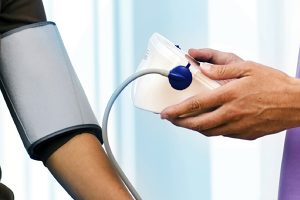Prevent High Blood Pressure: Get It Checked
If you haven’t had your blood pressure checked by a doctor lately, you could be one of the millions of Americans who has hypertension, but is completely unaware of it.
Unlike so many other serious health problems, high blood pressure – the “silent killer” – rarely causes any symptoms. That might explain why one out of five adults who has high blood pressure does not know it.
The only way to know if you have high blood pressure is to have it checked.
“Once you turn 40, you should have your blood pressure checked every year,” said Dr. Randall Ferro, MD, a board-certified family medicine physician with Monarch Medical Associates. “If it’s too high, you can take steps to control it.”
Two numbers indicate a person’s blood pressure level. The first number, systolic, represents the pressure in your blood vessels as your heart beats. The second number, diastolic, is the pressure in your vessels when your heart rests between beats. Measured in “millimeters of mercury,” high blood pressure is defined as 140/90 mmHg or higher.
Some people face a higher risk of hypertension. They include African Americans, people who have a family history of high blood pressure, those who are obese or have diabetes, and people who smoke, eat too much salt, drink too much alcohol, or often feel stressed or anxious.
High blood pressure can also be due to chronic kidney disease, pregnancy, medications, thyroid problems, and other medical issues.
In the majority of cases, no cause of high blood pressure is found.
Roughly 75 million American adults – one out of every three adults – have high blood pressure, according to federal statistics. Of those, only half have the condition under control, according to the Centers for Disease Control and Prevention.
“Untreated hypertension can lead to long-term damage of your heart and major organs such as your kidneys,” Dr. Fedro said. “If it gets really high, you can have a stroke.”
Fortunately, many patients can lower their blood pressure by exercising regularly, not smoking, and cutting sodium from their diet. Talking to your doctor first is important to make sure you know how to exercise safely.
“The amount and intensity of exercise you should do depends on how high your blood pressure is,” Dr. Fedro said. “We make sure that the type of exercise a patient plans to do is safe for their blood pressure level,” Fedro said. “Many patients initially start walking. It’s a good way to lose weight or maintain your weight.”
Sometimes, a person’s blood pressure is too high to solely recommend exercise and other healthy lifestyle habits. In those cases, patients will need to take medication to lower their blood pressure in addition to making other changes such as quitting smoking, eating healthier, and walking.
Patients who are prescribed medication should make sure to take it in the morning, not at night before bed. Otherwise the medication will not be working when they’re awake.
“The good news is that some people no longer need medication after they modify their lifestyle and lose some weight,” Fedro said.
To prevent high blood pressure – and lower your risk for heart disease and stroke – try the following tips for living a healthy lifestyle:
- Eat a healthy diet. Choose foods that are low in salt and high in potassium, which can lower your blood pressure. The DASH eating plan is one proven diet to help people lower their blood pressure.
- Maintain a healthy weight. Carrying excess pounds or obesity can increase your risk for high blood pressure.
- Exercise regularly. Adults should aim for 30 minutes of physical activity every day. Children and teens need one hour of physical activity daily.
- Don’t smoke. If you do smoke, quit. Ask your doctor for strategies to help you quit smoking.
- Limit alcohol use. Drinking too much alcohol can raise your blood pressure. Men should limit consumption to two drinks daily. For women, the limit is one drink per day.
Sources: Centers for Disease Control and Prevention, National Institutes of Health
By Dr. Randall Ferro, MD, board-certified family medicine physician with Monarch Medical Associates.
For additional information about blood pressure control, consult your primary care provider. Call 804-359-WELL or visit http://goodhelpdocs.com/ if you need help finding a healthcare provider.


Comments are closed